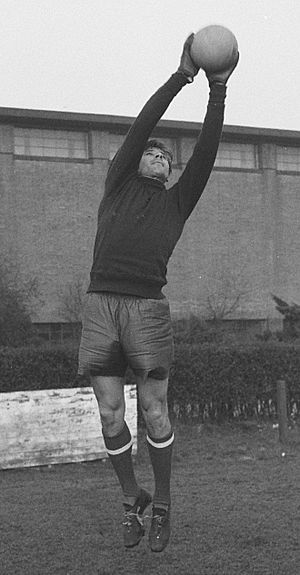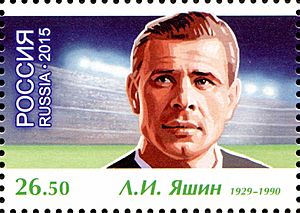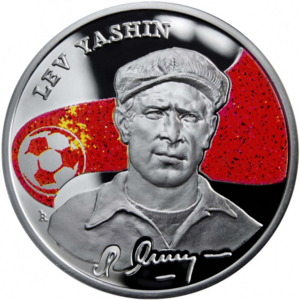Lev Yashin facts for kids
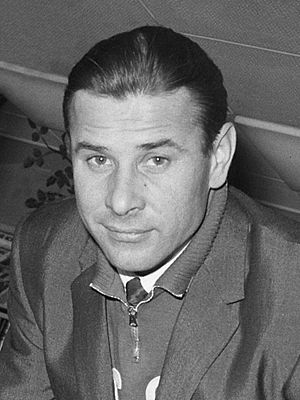
Yashin in 1965
|
||||||||||||||||||||||
| Personal information | ||||||||||||||||||||||
|---|---|---|---|---|---|---|---|---|---|---|---|---|---|---|---|---|---|---|---|---|---|---|
| Full name | Lev Ivanovich Yashin | |||||||||||||||||||||
| Date of birth | 22 October 1929 | |||||||||||||||||||||
| Place of birth | Moscow, Russian SFSR, Soviet Union | |||||||||||||||||||||
| Date of death | 20 March 1990 (aged 60) | |||||||||||||||||||||
| Place of death | Moscow, Russian SFSR, Soviet Union | |||||||||||||||||||||
| Height | 1.89 m (6 ft 2 in) | |||||||||||||||||||||
| Position(s) | Goalkeeper | |||||||||||||||||||||
| Youth career | ||||||||||||||||||||||
| 1948–1950 | Dynamo Moscow | |||||||||||||||||||||
| Senior career* | ||||||||||||||||||||||
| Years | Team | Apps | (Gls) | |||||||||||||||||||
| 1950–1970 | Dynamo Moscow | 326 | (0) | |||||||||||||||||||
| International career | ||||||||||||||||||||||
| 1956 | Soviet Union Olympic | 6 | (0) | |||||||||||||||||||
| 1954–1970 | Soviet Union | 74 | (0) | |||||||||||||||||||
|
Medal record
|
||||||||||||||||||||||
| *Club domestic league appearances and goals | ||||||||||||||||||||||
Lev Ivanovich Yashin (Russian: Лев Иванович Яшин; born October 22, 1929 – died March 20, 1990) was a famous Soviet professional football player. Many people think he was the greatest goalkeeper in the history of the sport. He was known for being very athletic and brave. He also had amazing reflexes and a strong presence in the goal.
Yashin was nicknamed the "Black Spider" or the "Black Panther". This was because he often wore an all-black (or very dark blue) uniform. He changed how goalkeepers played the game. Instead of just waiting in the goal, he would shout orders to his defenders. He also came out to catch crosses and even ran out to challenge attackers. This was very new for his time!
His incredible skills were seen by the whole world during the 1958 FIFA World Cup, which was the first World Cup shown internationally. He played in four World Cups between 1958 and 1970. FIFA, the world football organization, says Yashin saved over 150 penalty kicks in his career. This is more than any other goalkeeper! He also kept over 270 "clean sheets" (games where he didn't let any goals in).
Yashin won a gold medal at the 1956 Olympic football tournament. He also won the 1960 European Nations' Cup. In 1963, he received the Ballon d'Or award. This is a huge honor, and he is the only goalkeeper ever to win it. He was also named the best goalkeeper of the 20th century.
Contents
Early Life and Start in Football
Lev Yashin was born in Moscow, Russia. His family worked in factories. When he was 12, World War II started, and he had to work in a factory to help his country.
Later, he faced health challenges that made factory work difficult. He was then sent to work at a military factory in Moscow. It was there that his football talent was noticed. He was invited to join the youth team of Dynamo Moscow.
Club Career with Dynamo Moscow
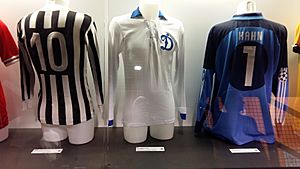
Yashin's first game for Dynamo Moscow in 1950 was a friendly match. It didn't go well, as he let in an easy goal. For a few years, he didn't play many senior games. But he was determined and kept training hard in the reserves.
During these early years, Yashin also played as a goalie for the Dynamo ice hockey team. He even won a Soviet ice hockey cup in 1953! But soon after, he decided to focus only on football.
He played his entire professional football career with Dynamo Moscow, from 1950 to 1970. With them, he won the Soviet Top League five times. He also won the Soviet Cup three times.
International Career and World Fame
In 1954, Yashin joined the Soviet national team. He played 78 games for his country. With the national team, he won the gold medal at the 1956 Summer Olympics. He also helped them win the first European Championship in 1960.
Yashin played in three World Cups: 1958, 1962, and 1966. He kept four "clean sheets" in his 12 World Cup games.
The 1958 FIFA World Cup in Sweden made Yashin famous. Even though the Soviet team lost to Brazil (who won the Cup that year), Yashin's performance was amazing. He faced stars like Garrincha and a young Pelé, and his saves kept the score from being much higher.
In 1962, during the World Cup, Yashin faced some challenges. He made a few unusual mistakes, like letting in a goal directly from a corner kick against Colombia. Some newspapers even thought his career might be over. However, he made a fantastic save against Chile in the quarter-final, even though the Soviet Union lost.
Despite the 1962 World Cup, Yashin showed his strength. In December 1963, he won the Ballon d'Or award. One of his best games that year was against England, where he made many spectacular saves. From then on, he was known as the "Black Spider" or the "Black Panther" because of his dark uniform and incredible saves.
Yashin led the Soviet team to their best World Cup finish in 1966, reaching fourth place in England. He even went to the 1970 FIFA World Cup in Mexico as a third-choice backup and assistant coach.
In 1971, he played his last match for Dynamo Moscow. A special farewell game was held in Moscow with 100,000 fans. Many football legends like Pelé and Franz Beckenbauer came to play.
Life After Playing Football
After retiring, Yashin worked for Dynamo Moscow in different roles for almost 20 years. A bronze statue of him stands at the Dynamo Stadium in Moscow.
Sadly, Yashin passed away in 1990. He was given a state funeral, which is a big honor. His wife, Valentina, and his daughters, Irina and Elena, survived him. His grandson, Vasili Frolov, also played as a goalkeeper in Dynamo's youth teams. He now runs a goalkeeper training school in Moscow.
Yashin's Unique Style and Achievements
Many people believe Yashin was the greatest goalkeeper ever. He was tall and had amazing athleticism, quickness, and bravery. His reflexes allowed him to make incredible, acrobatic saves.
Yashin is still the only goalkeeper to have won the Ballon d'Or award in 1963. He also saved more than 150 penalty kicks and kept over 270 clean sheets in his career. For his great service to his country, he received the Order of Lenin in 1967, which was the highest award in the Soviet Union.
Yashin changed the goalkeeper position. He was a strong leader on the field, shouting instructions to his defenders. He would come out of his goal to stop crosses and even run out to challenge attackers. This was very new at the time, as most goalkeepers stayed on their line. He also started the practice of punching the ball away in difficult situations instead of trying to catch it. He would quickly throw the ball to start counterattacks. These are all common practices for goalkeepers today!
In 1994, FIFA created the Yashin Award for the best goalkeeper at the World Cup. FIFA also named Yashin as the only goalkeeper in the World Team of the 20th Century. Many football experts consider him the best goalkeeper in history.
Legacy and Tributes
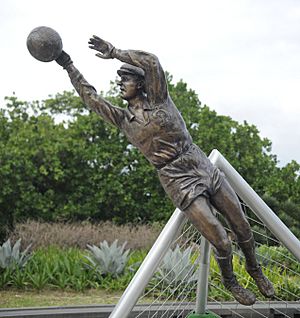
Lev Yashin is remembered in many ways:
- A song called "Goalkeeper" was written about him in 1971.
- Poems have been written in his honor.
- A Russian movie about his life, called Lev Yashin: Goalie of My Dreams, was released in 2017.
- Statues of Yashin stand at the Luzhniki Stadium and Dynamo Stadium in Moscow.
- The new Dynamo Moscow stadium, VTB Arena, is officially named Lev Yashin Stadium.
- Several streets in Russian cities are named after him.
- He is featured as an "Ultimate Team Icon" in the FIFA video game series.
- In 2017, Yashin appeared on the official poster for the 2018 FIFA World Cup. In 2018, he was also on a new 100-ruble banknote celebrating the World Cup.
Ice Hockey Career
Lev Yashin was also a talented ice hockey goalie. He played for Dynamo Moscow's ice hockey team. In March 1953, he helped them win the Soviet Cup. He stopped playing ice hockey in 1954 to focus completely on his football career.
Career Statistics Summary
Lev Yashin played a total of 812 career games.
- He played 326 games for Dynamo Moscow.
- He played 74 games for the Soviet Union national team.
- He played 12 games in the FIFA World Cup.
- He is estimated to have saved over 150 penalty kicks.
- He kept 270 clean sheets (games without letting in a goal).
Honours
Football
Dynamo Moscow
- Soviet Top League: 1954, 1955, 1957, 1959, 1963
- Soviet Cup: 1953, 1966–67, 1970; runner-up: 1955
Soviet Union
- UEFA European Football Championship: 1960; runner-up: 1964
- Olympic Games Gold Medal: 1956
- FIFA World Cup Fourth place: 1966
Individual
- European Goalkeeper of the Year: 1956, 1957, 1959, 1960, 1961, 1963, 1964, 1965, 1966
- UEFA European Championship Team of the Tournament: 1960, 1964
- USSR Goalkeeper of the year: 1960, 1963, 1966
- Ballon d'Or: 1963
- World Soccer World XI: 1963, 1964, 1966, 1967
- FIFA XI: 1963, 1968
- Europe XI: 1964, 1964, 1965
- European football Oscars: 1963-64
- World XI selected by italian press. 1960, 1961
- Order of Lenin
- Silver Olympic Order
- FIFA Order of Merit
- Placar's All-Time Team
- Placar's 100 Stars of the Century: #11
- FIFA World Cup All-Time Team
- Planète Foot's All-Time Team
- France Football's Football Player of the Century: #10
- Planète Foot's 50 Best Players of all Time
- Venerdì's All-Time Team
- Venerdì's 100 Magnificent
- World Soccer's 100 Greatest Footballers of All Time: #11
- World Team of the 20th Century
- Voetbol International's Team of the Century
- Voetbol International's World Stars by Raf Willems
- Jornal A Tarde All-Time Team
- Placar's 100 Stars of the World Cup: #23
- O Estado de São Paulo All-Time Team
- Berlin-Britz Team of the Decade (1960s)
- World Hall of Fame of Soccer
- FIFA Goalkeeper of the 20th Century
- FIFA World Cup Dream Team
- Golden Player of Russia
- World Soccer Greatest XI of all time
- World Sports dream team of the past 20 years: 1970
- IFFHS Legends
- IFFHS World Goalkeeper of the Century
- IFFHS European Goalkeeper of the Century
- Ballon d'Or Dream Team
- IFFHS All-time Men's Dream Team
- IFFHS All-time Europe Men's Dream Team
Ice hockey
Dynamo Moscow
- Soviet Cup: 1953
See also
 In Spanish: Lev Yashin para niños
In Spanish: Lev Yashin para niños
 | Jackie Robinson |
 | Jack Johnson |
 | Althea Gibson |
 | Arthur Ashe |
 | Muhammad Ali |


